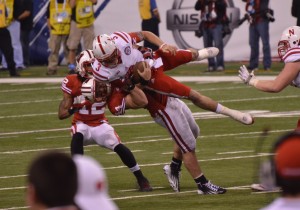For years NFL players have been affected by one of the worst and most traumatizing injuries known: a brain injury. The constant heavy contact involved with playing football makes the risk for a brain injury increase dramatically. In the past week, San Francisco 49ers Rookie, Chris Borland, has retired after a single season in the NFL due to his concerns of the lasting effects of a brain injury. He is among a handful of other young NFL players to retire just this week, citing repetitive brain injury and concussions as the reason for retirement. The NFL has been criticized in the past over its procedure in handling these types of head injuries.
What is a brain injury?
A brain injury, defined by biausa.org, is described as an “alteration in brain function, or other evidence of brain pathology, caused by an external force.” A brain injury can occur in different severity levels such as: concussion, contusion, open head injury and closed head injury, among others. In the case of football players, most who are diagnosed with a brain injury or TBI (traumatic brain injury) experience several closed head injuries in the form of concussions over the course of their career. Helmets do help in preventing brain injury, but cannot guarantee that the person wearing the helmet will not experience a TBI.
What are the symptoms of a brain injury?
A mild traumatic brain injury can sometimes be mistaken for a less serious injury. Some people feel their pain and symptoms will subside in a short amount of time and that medical care is not necessary. If you believe you have suffered a brain injury, no matter how severe, you should be checked out by a physician. You should immediately contact your doctor or hospital if you experience any of the following symptoms after an injury involving your head:
- Headache
- Fatigue
- Sleep disturbance
- Irritability
- Sensitivity to noise or light
- Balance problems
- Decreased concentration and attention span
- Decreased speed of thinking
- Memory problems
- Nausea
- Depression and anxiety
- Emotional mood swings
Being aware of the symptoms and warning signs are your best defense against battling a TBI. If you have sustained a brain injury, the doctor will likely recommend you undergo a CT or MRI to assess what damage has been sustained. Following the imaging studies, you will probably be referred to a neuropsychologist to assess your level of function. After this assessment, the doctor will be in a better position to recommend a course of treatment with various medications and therapy.
Is the NFL doing too little to protect players?
It is unclear whether Chris Borland ever experienced the symptoms of a brain injury. In his statement, he explained his decision was made based on the possible quality of life he would have after his career was over if he continued to sustain repetitive head trauma. In a statement he remarked:
“I feel largely the same, as sharp as I’ve ever been, for me it’s wanting to be proactive. I’m concerned that if you wait till you have symptoms, it’s too late. … There are a lot of unknowns. I can’t claim that X will happen. I just want to live a long healthy life, and I don’t want to have any neurological diseases or die younger than I would otherwise.”
According to studies by ESPN, more than 70 former NFL players were diagnosed with a brain injury or progressive neurological disease following their untimely deaths. NFL icons Mike Webster and Dave Deurson were diagnosed with a disorder called chronic traumatic encephalopathy after their deaths. It is clear Chris Borland does not want to end up as a brain injury statistic as some of his idols have.
The NFL has recently admitted nearly 3 out of every 10 NFL players will develop a debilitating brain condition as a result of the repetitive head trauma they sustain each season. This revelation came about as a class action lawsuit has progressed involving over 4,500 former players. A judge approved a settlement in excess of $675M paid out to players for compensatory damages, along with an additional $200M+ to be used for future medical care, research, testing and attorney fees for the related litigation.
We are pleased to see this issue being addressed. The effects of a brain injury are often long term and cannot always be detected at an early stage. It’s important that the NFL and other agencies who deal with athlete injuries of this type are informed and proactive about finding a solution.

Trackbacks/Pingbacks